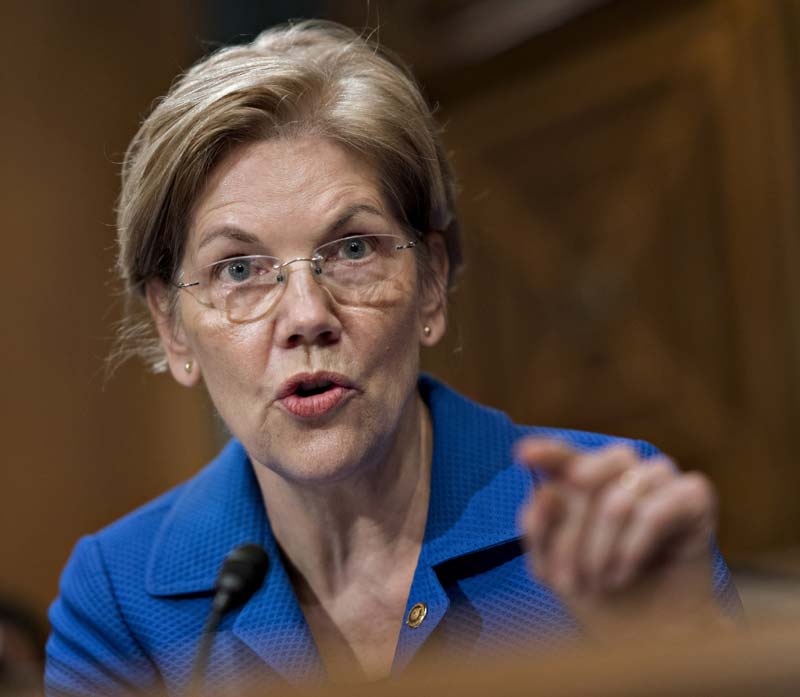 Andrew Harrer for Bloomberg
Andrew Harrer for Bloomberg
- Sen. Elizabeth Warren, D-Mass., during a campaign event in Des Moines, Jan. 5
"I don't take corporate PAC money. Shoot, I don't take PAC money of any kind."
--- Warren, during a campaign event in Manchester, New Hampshire, Jan. 1
![]()
This is a well-practiced line in Warren's stump speech, down to the pregnant pause before the word "shoot."
A reader asked what she meant, given that federal elections records show that she has taken contributions from political action committees as recently as her 2018 Senate race. The numbers are not high, but there were more than $350,00 in PAC contributions in the 2017-2018 cycle, according to the Center for Responsive Politics. There was less than $50,000 from businesses; the rest was from labor groups and ideological PACS, such as Emily's List.
In context, Warren raised nearly $35 million for the 2018 race, so the PAC money barely exceeds 1 percent of the total. Still, there was some PAC money. Over the course of her career, Warren raised more than $1.4 million from PACS, with only 8.5 percent from business PACs.
As a reader service, here's an explanation of what Warren means when she says she doesn't "take PAC money of any kind."
Warren is not alone in swearing off corporate PAC money. Many other Democrats considered possible presidential candidates in 2020 have said they won't take corporate PAC money.
But there's less to this than meets the eye. Corporate PACs are not really where the money is. A recent report by the Bipartisan Policy Center noted that the expected influx of corporate campaign money in the wake of the Supreme Court decision in Citizens United v. FEC (2010) has not materialized.
"The 'new money' that has entered the system since that decision is largely from individuals, many of whom have business or corporate connections, but a very small share of campaign financing comes from corporate treasury funds," the report said. "If anything, unions appear to have taken greater advantage of Citizens United, as they have spent more of their treasury money in this fashion."
In other words, corporate PACs are not much of a player - and they tend to not be especially ideological, supporting mainly incumbents from both parties. The money really comes from people who work at those companies - who may often contribute the maximum amount possible.
As we noted, Warren took very little money from business PACs, instead gathering funds mostly from labor and ideological PACs. A Warren campaign aide said she stopped taking contributions from all such PACs after she gave a speech on Aug. 21, 2018, at the National Press Club to announce a bill aimed at reducing the impact of money on politics.
Federal Election Commissions records confirm that Warren began returning any PAC money that was received after that speech. For instance, the American Association of Orthodontists PAC sent a $1,000 check in October that was returned. So was $5,000 from Moveon.org Political Action in September.
"You need to distinguish between normal PACs and super PACs," said Nathaniel Persily, a Stanford University law professor who was a co-author of the BPC report. "Normal PACs still give some money to candidates, but it is in discrete amounts. They get drowned out by super PACs, which can receive unlimited sums from virtually any domestic source, but which cannot coordinate with a candidate. The more interesting question will be whether Warren actively prevents a super PAC from forming that would support her."
Super PACS emerged in the wake of the 2010 Supreme Court ruling and are the repositories of potentially unlimited funds, raised from very wealthy individuals. Persily noted that a super PAC supporting former Florida Gov. Jeb Bush (R) raised more than $100 million during his unsuccessful bid for the presidency.
So we put the question to the Warren campaign. The answer: She would encourage any super PAC designed to support her to cease its operations.
We also asked whether she would refuse contributions from the Democratic National Committee because it receives money from corporate PACs. The answer was yes. We also inquired about Emily's List, since its PAC receives money from labor PACs. The answer: She would return money from the Emily's List PAC.
But as we noted, individual contributions often amount to far more than PAC contributions. Emily's List contributed $5,000 to Warren via its PAC in 2017. But she also received $123,200 from individuals via the group from 2013 to 2018, according to CRP.
Large individual contributions make up about 31 percent of the funds raised by Warren between 2013 and 2018, compared with nearly 56 percent from small contributions under $200.
We could quibble with the phrasing of Warren's line, in that a listener might think she has never taken PAC money. But she puts it in the present tense, and that's been the case since her August speech. In any case, giving up corporate - or even non-corporate - PAC money was not an especially hard lift since such funds represent only a small portion of the funds she raised for her Senate races. There is nothing to stop individuals at companies or labor unions from contributing the maximum amount possible to her.
But if they wanted to do it through a super PAC, apparently they would be out of luck.
An award-winning journalism career spanning nearly three decades, Glenn Kessler has covered foreign policy, economic policy, the White House, Congress, politics, airline safety and Wall Street. He was The Washington Post's chief State Department reporter for nine years, traveling around the world with three different Secretaries of State. Before that, he covered tax and budget policy for The Washington Post and also served as the newspaper's national business editor. Kessler has long specialized in digging beyond the conventional wisdom, such as when he earned a "laurel" from the Columbia Journalism Review


 Contact The Editor
Contact The Editor
 Articles By This Author
Articles By This Author